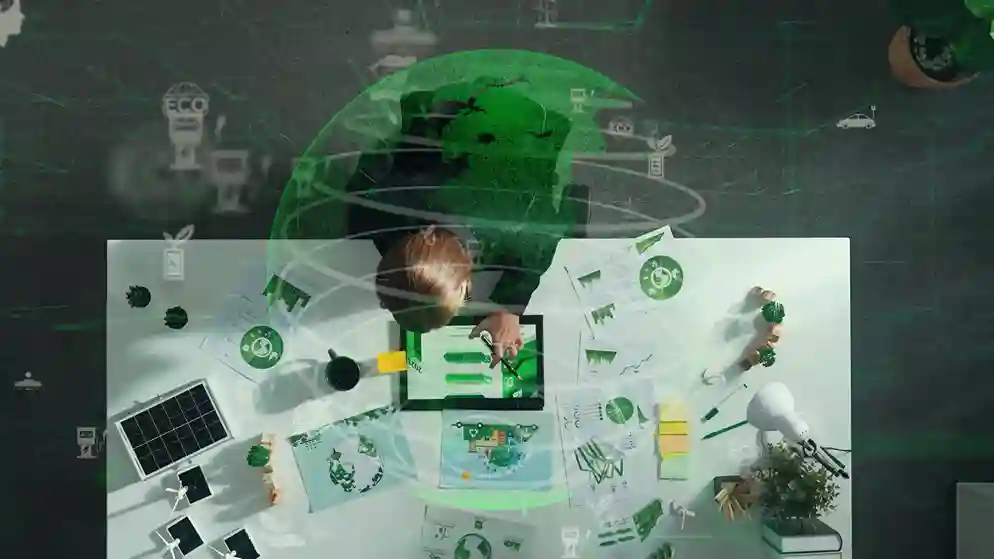Sustainable Tech in Your Business: Making the Switch without Compromising on Efficiency

Sustainable Tech in Your Business: Making the Switch without Compromising on Efficiency
The tech industry has still made some very radical changes to becoming more eco-friendly in recent years. With more and more focus around the environment, small to medium size businesses (SMB) in particular, are being put under the pressure to implement environmentally friendly tactics. But the myth of unsustainability and efficiency is still alive. Business owners who would like to get “greener” are concerned that this will slow their pace of operations and lead to more expensive and less productive working conditions. So it’s no wonder that businesses struggle with finding the answer to the question: Can businesses be sustainable and still maintain business operations effectively?
At ICTechnology, we believe the answer is yes. Of course, many sustainable technologies are in fact designed to be more efficient, streamline processes, and reduce costs. You don’t have to sacrifice performance to be environmentally responsible. We’ll explore how small and medium-sized businesses can go green without sacrificing productivity and how ICTechnology can offer in this transition with right solutions that help businesses become more sustainable and efficient.
The Environmental Challenges in the Tech Industry
Before we explore the solutions, you should understand the problem with tech and the environment. The tech industry is the master of innovation but the most resource-intensive sector of them all. Producing, delivering and using the tech we love consumes a lot of resources, and has a big carbon footprint. They notoriously require an enormous amount of energy, and as more businesses move over to cloud storage, the environmental impact continues to grow.
In Australia, the government has committed to reaching net-zero carbon emissions by 2050, with the business sector most likely to lead the way in addressing this goal. While large corporations may have the resources to implement green practices, small and medium-sized businesses often face challenges in adopting environmentally friendly measures without jeopardising their efficiency or cost them too much.
Busting the Myth: Sustainability and Efficiency Aren’t Mutually Exclusive
One misconception about sustainability is that it is the opposite of efficiency. Most business owners think that becoming environmentally friendly means they have to cut back on services or slow down operations. However, this is far from the truth. Sustainable practices are often designed to make things more efficient, reduce waste, and ultimately save costs.
In reality, having a business strategy that incorporates sustainability can improve productivity and efficiency in many different ways. Through the right technology and practice choices, businesses can cut back on their energy use and enhance their bottom line—all while helping to meet their environmental goals.
5 Ways to Make Your Business More Environmentally Sustainable with Technology
As the world becomes more conscious of the need to protect the environment, businesses are under increasing pressure to reduce their carbon footprints. In the tech industry, there are several practical ways small and medium-sized businesses can stay sustainable without compromising their operational efficiency. From cloud computing and IoT systems to energy-efficient hardware, there are many eco-friendly solutions that can benefit your business. Now, here are some realistic ways smaller businesses can remain environmentally healthy, without losing out on productivity.
Cloud Computing: A Greener Alternative to Traditional IT Infrastructure
One of the most impactful ways businesses can reduce their environmental footprint is by moving from on-premise servers to cloud-based solutions. Traditional data centres are notorious for consuming large amounts of energy, whereas cloud service providers like Amazon Web Services (AWS), Microsoft Azure, and Google Cloud are increasingly powered by renewable energy.
Many cloud providers have made substantial strides towards carbon-neutral data centres, with some even working towards net-zero emissions. By shifting to cloud-based services, businesses not only reduce the need for physical servers, but they also lower their energy consumption and minimise the e-waste associated with outdated infrastructure. Cloud computing offers the added benefit of scalability, allowing businesses to grow without the environmental cost of constantly upgrading hardware.
Internet of Things (IoT) Systems: Smarter Resource Management
The Internet of Things (IoT) is another excellent tool for businesses looking to improve both efficiency and sustainability. IoT devices collect data from connected systems, giving businesses valuable insights into how resources are being used. By leveraging this data, businesses can optimize their operations to reduce energy consumption, waste, and inefficiencies.
For example, IoT systems can monitor energy usage in real-time, allowing businesses to adjust operations based on demand. Whether it’s controlling the lighting, heating, or cooling in an office or monitoring machine performance in a manufacturing setting, IoT systems can help businesses make smarter decisions that align with sustainability goals while maintaining operational efficiency.
Energy-Efficient Hardware: The Backbone of Sustainable Tech
The environmental impact of hardware production and disposal is often overlooked. From computers and servers to printers and mobile devices, the tech sector generates significant e-waste. However, businesses can reduce their environmental footprint by choosing energy-efficient devices that consume less power and generate less heat.
Energy-efficient devices use less electricity, which lowers operational costs and reduces the need for cooling systems. Moreover, many manufacturers are now focusing on creating products that use sustainable materials and are easier to recycle. By investing in energy-efficient hardware, businesses not only reduce their environmental impact but also save money in the long term.
Digital Transformation: Reducing Paper Waste
In today’s digital world, one of the simplest ways businesses can become more sustainable is by reducing paper waste. Many businesses still rely on paper-based processes for communication, record-keeping, and documentation. However, making the switch to digital solutions can have a significant environmental impact.
By adopting cloud storage, digital signatures, and electronic document management systems, businesses can drastically reduce their paper consumption and the associated waste. Moreover, digital solutions increase efficiency by making information more accessible and improving collaboration between teams.
Remote Work: Reducing the Need for Commuting
Remote work has become increasingly popular, and for good reason. Not only does it offer employees flexibility, but it also contributes to environmental sustainability. By allowing employees to work from home, businesses can significantly reduce their carbon footprint by eliminating the need for commuting.
The use of cloud-based tools, video conferencing, and collaborative platforms enables businesses to stay productive while minimizing travel-related emissions. In many countries, where long commutes are common in metropolitan areas, reducing the need for travel can make a noticeable difference in overall emissions.
ICTechnology’s Commitment to Sustainability
Though the tech industry, like many others, is increasingly looking to embrace sustainability, we understand that small and medium-sized businesses may face challenges in adopting eco-friendly practices while maintaining their day-to-day efficiency.
At ICTechnology, we are committed to helping businesses in Australia and beyond achieve their sustainability goals whilst maintaining or improving efficiency and productivity. We understand that small and medium-sized businesses may feel uncertain about how to adopt sustainable practices while maintaining productivity. That’s why we provide custom solutions that balance both sustainability and efficiency. We offer cloud-based solutions tailored to meet the needs of small and medium-sized businesses, enabling them to scale quickly and efficiently while being environmentally responsible. Our IoT systems help businesses monitor and manage resource consumption, reduce energy costs, and contribute to sustainability goals. Furthermore, our consulting services guide businesses in choosing energy-efficient devices and provide digital tools for remote work,which guaranties high productivity and low carbon footprints. Through these solutions, we aim to support businesses in becoming more resilient, saving costs in the long term, and contributing to a greener future.
With our services, we want to help businesses achieve their environmental goals but also to be competitive in the marketplace. By embracing sustainable practices, businesses can help in saving costs gradually, lead to less waste and contribute to a greener future.
The Future of Sustainable Tech

the future of sustainable tech with ICTechnology
The tech industry is changing, sustainability has become more relevant than ever. Small and mid-sized organizations have an interesting opportunity to lead the charge in adopting environmentally healthy practices while maintaining efficiency. With solutions like cloud computing, IoT systems, energy-efficient hardware, and digital transformation,businesses can lower their environmental impact and drive productivity.
By partnering with ICTechnology, you can successfully make the transition, ensuring that your business is both environmentally responsible and highly efficient. Together we can create a greener future for your business that is sustainable while maintaining a competitive edge. Ready to make the switch to sustainable tech? Let’s work together to create a more efficient, eco-friendly future for your business!
References
Australian Government. (2020). Australia’s emissions projections 2020. Department of Industry, Science, Energy, and Resources. https://www.industry.gov.au/publications/australias-emissions-projections-2020





